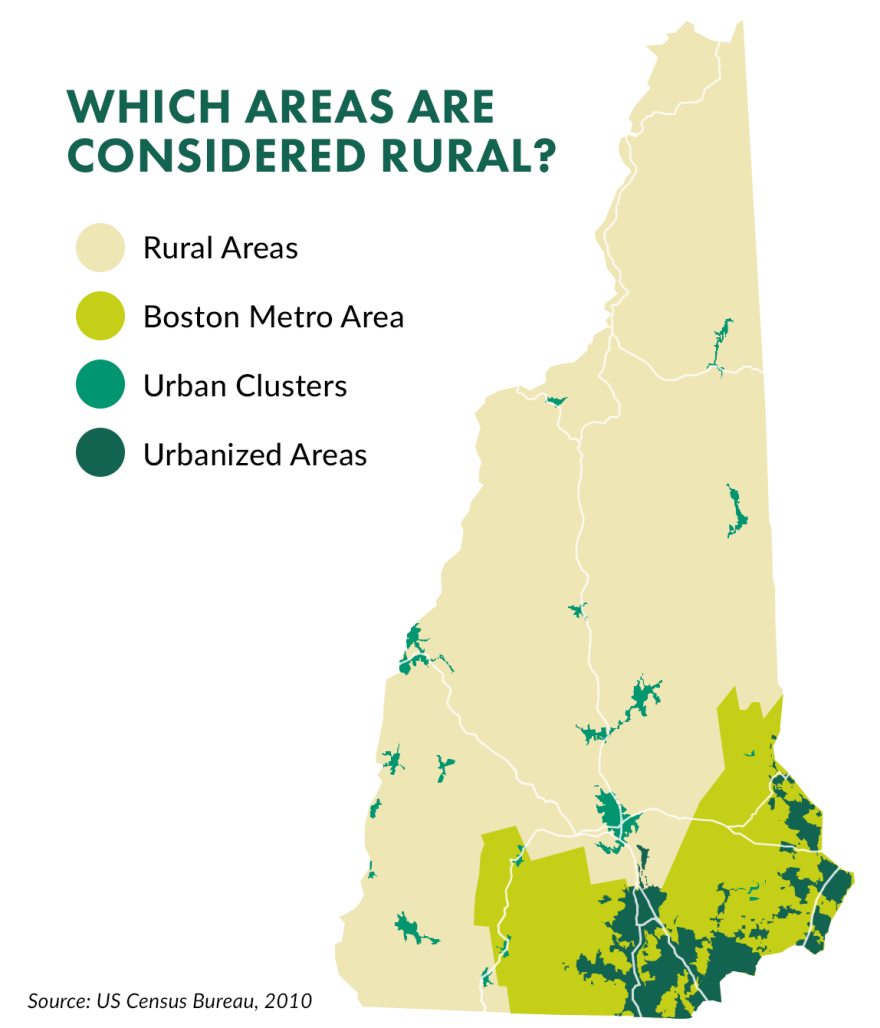In their effort to woo voters before next month’s primary, Democratic Presidential candidates have come out with an array of policy plans, including ones to revitalize the rural United States. NHPR’s Sarah Gibson has been looking at what these plans might mean for rural New Hampshire and talking to voters about their concerns.
She sat down with All Things Considered host Peter Biello earlier today to discuss where the candidates stand on rural issues.
(Related story: As Rural N.H. Changes, Democrats Eye Voters in Republican Strongholds)
(This transcript has been lightly edited for clarity.)
So, when candidates talk about “rural” issues, what do they mean?
Well, rural means a lot of different things depending on where you are. So when candidates are campaigning in Iowa, rural means more agricultural, so their policies around agriculture and family farms are kind of at the forefront. Whereas here in New Hampshire, when they're talking about rural issues, they tend to focus on platforms that really resonate with a lot of Democratic voters here in New Hampshire. Things like protecting the environment, expanding treatment for opioid addiction, improving health care, and specifically in rural areas, expanding access to affordable broadband.

And so where do the candidates stand on those issues?
So let's start with broadband. Many want to invest more in expanding access to broadband, particularly in rural areas. And they're part of larger infrastructure plans. So, for instance, Bernie Sanders has proposed putting $150 billion into Internet infrastructure. Elizabeth Warren says she would put $85 billion in and regulate Internet companies more. Tom Steyer actually says he'll put $135 billion specifically into rural broadband.
And this question of Internet connectivity has real consequences for rural New Hampshire. So, for instance, if you want to expand telemedicine in rural areas, you can't do that without good Internet. If you want to give homework assignments to elementary school students who have tablets, they can't get those done if they don't have Internet at home. And there are groups really throughout the areas of New Hampshire that have pretty poor Internet access like Carroll County and Cheshire County that are organizing to bring broadband. They say the lack of Internet connectivity has decreased property values. It's made it harder to attract people to start small businesses. So, again, real consequences here in little pockets of New Hampshire. And it's certainly something that many voters talk to me about.
[Story continues below.]
And you mentioned telemedicine, and of course, that is one part of the rural health care picture. But the other part, of course, is actually having medical professionals there, hospitals there, facilities there. What are candidates saying and what are the concerns from rural voters about having physical hospitals in their areas?
Yes. So that's a pretty big one. There is a shortage of doctors and nurses and other providers in rural New Hampshire. It's really hard to recruit them and then to keep them there. So there are various proposals from candidates involving expanding loan repayment programs, actually giving incentives to people who will do their residencies or stay in rural parts of America. And actually, Pete Buttigieg and Amy Klobuchar have said that they'll also expand those loan repayment opportunities to people who are doing addiction and mental health work in rural America.

And then there's this other pretty big concern here in New Hampshire and across the country about hospital closures and consolidations. So here in New Hampshire since 2000, we've seen nine hospitals close their labor and delivery units. There's also a real struggle for rural hospitals to get proper reimbursement and they're just struggling to stay open. So several candidates, including Tom Steyer, Amy Klobuchar and Elizabeth Warren, have said that they'll enact regulations to prevent hospital closures and prevent hospital mergers in rural parts of the country.
So why do these candidates feel like it's so important to hone their message for rural voters this time around?
Well, there are a couple of reasons. One is there's a demographic shift underway here in New Hampshire that several researchers from UNH have noted. Basically the Democratic Party over time has expanded its rural base. So there are more independents and Democrats in rural New Hampshire who might have a real impact on both the primary and the general election.
And then, of course, there's the victory of President Trump in 2016, which really changed how Democrats think about rural voters and their possible impact. So Dr. Kenneth Johnson, who's a demographer at UNH told me this: "Rural America has been ignored in much of the political rhetoric of the last several decades, aside from foreign policy. And I think if Trump's victory did anything it was to alert Democrats and Republicans that rural America can still make a difference in what happens."
And Johnson went on to say, it's not that the Democrats have to win rural America, but they certainly can't lose as badly as they did in 2016 and still win. So we can see them kind of honing these messages in places like Wolfeboro and Littleton and kind of seeing what has traction with rural voters. And that may affect how they speak to people, say, in Wisconsin and Pennsylvania once they're on the campaign trail later on this year.
Editor's note: This story has been updated to include recent policy proposals by former Massachusetts Gov. Deval Patrick.










